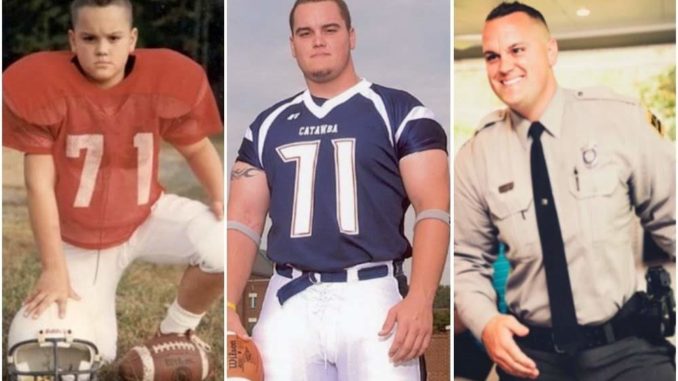
Many aspects of day-to-day life have been interrupted in the wake of the COVID-19 outbreak, and the world of sports is no different.
With entire athletic seasons canceled and countless gymnasiums and practice fields quarantined, it has been quite the change of pace for sports fans, especially athletes themselves.
Whit Efird, a former standout offensive tackle from West Stanly’s class of 2002 who went on play college football at UNC Chapel Hill and Catawba College, spoke with SCJ about what he would say to aspiring athletes in these unprecedented days.
“The advice I would give is to start preparing for whatever you’re planning on doing after sports,” Efird said. “Sports are expendable and don’t last forever, so enjoy them while you still have them — but you also have to be preparing for your future. In this day and time, all we can do is adapt. This coronavirus is showing us what our real priorities are in life.”
Efird, now in his ninth year as a member of the North Carolina Highway Patrol, currently lives in Oakboro and serves as a senior trooper. After graduating from college, he pursued a career that he had admired his whole life.
“When I was young, my mother was the deputy clerk of court and I got to know a lot of patrolmen. I always looked up to them and liked the way they carried themselves,” Efird said. “I wanted to go into highway patrol since I was little.”
Even though his football career ended when he graduated from Catawba College in 2006, he still reminisces on his gridiron days, which began as first-grader at Locust Elementary. From there, he played youth league football at Endy Elementary and then high school football at West Stanly from 1999 to 2002.
Efird was a three-year starter at right offensive tackle (as well as the team’s kicker) with the Colts, a two-year all-conference and all-county player, a member of North Carolina’s Shrine Bowl team, and was ranked among the top 20 players in the state by the Raleigh News & Observer.
“We went to the playoffs three times while I was at West Stanly — my freshman year, sophomore year and my junior year,” Efird said. “We were always really good and competed with Albemarle for the Stanly Cup every year. Unfortunately for us, Albemarle won that three years in a row.”
As a top in-state prospect — a 6-foot-5, 310-pound offensive lineman who averaged five pancake blocks a game — Efird received several offers from Division I programs, including UNC, a team he had always cheered for.
One aspect of Efird’s recruiting process was the involvement of UNC assistant coach and former All-Conference Tar Heel Rod Broadway, who had also played football at West Stanly and was teammates with Whit’s father, Mike.
“After speaking with him and visiting, he did have an influence on it. I wanted to go up to Chapel Hill and do just like him,” Efird said. “Obviously, I didn’t stay there long enough to do that, but I feel like I made an impact at Catawba College playing football.”
Efird’s journey as a Tar Heel was quickly cut short after he suffered a back injury that resulted in surgery. He decided to transfer to Catawba College in Salisbury following rehab and received a medical redshirt for his injury.
With the Catawba Indians, Efird played the next four years splitting time between the right and left tackle positions on a team that spent time at the top of the South Atlantic Conference.
“It was one of those things where the program [UNC] itself was having issues. If you’re not happy somewhere, go make yourself happy — so that’s what I did,” Efird said. “People think that because you go to a smaller school, the football isn’t the same as a big college like Chapel Hill. But the football is no different – the crowd size is.”
Efird said his football experiences provided him with skills that he uses to this day, especially in a profession that can be dangerous on a daily basis.
“The big thing about sports is mental toughness, and that’s carried way over into my adult life,” he said. “That proved to be very certain in my career now, especially after going through basic school, which was both mentally and physically demanding; being able to put yourself further than your brain will allow you to is what creates that toughness.”
